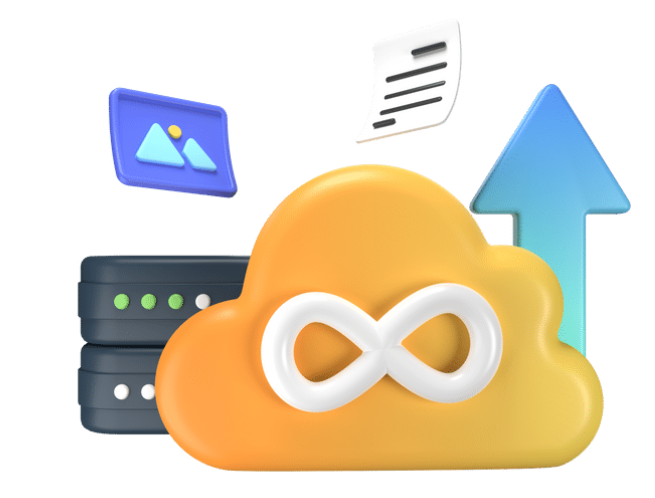Cloud storage is one of the latest advancements in the field of technology. You must have heard about businesses transferring to cloud platforms and storage going online. Cloud Computing is a service such as applications, storage, databases, servers, networking, etc provided through the internet remotely.
Earlier, we used to store any type of data on our local computers, smartphones, hard drives, or tablets that had to be accessed locally on the same device. Either we had to carry the device everywhere to have access to the stored data or the best we could do was wait.
Cloud storage revolutionized how we used to store data on our devices. In this article, let us know what cloud storage is and its uses.
What is Cloud Storage?
Cloud Storage is a method of storing data on a network or remote servers that can be accessed remotely over the internet. Cloud based storage is efficient in storing large amounts of data and the best part is users can access their data from anywhere.

With cloud storage, we are no longer limited by location or device. Cloud storage is one of the long list of services available in the cloud. Cloud computing is revolutionising the way we used to interact with technologies.
Users can access their stored data using a public internet connection or private internet connection. The data you store in the cloud is maintained and managed by the third-party cloud provider. They are responsible for hosting, managing, and securing your data on the servers and ensuring that you have 24×7 access to your data from anywhere in the world and anytime you need it.
Cloud Storage: Key Takeaways
- With the help of cloud storage services, you can access your data from anywhere and anytime you want.
- Cloud storage provides a cost-effective, scalable, and efficient method of storing data through the Internet.
- The cloud storage service is one of the best alternative storage solutions other than storing files locally on hard drives or local offline devices.
- There are four cloud storage models i,e. Public, private, hybrid, and multi-cloud.
- Cloud storage pricing depends on the service provider. They provide various types of pricing based on your requirements.
Do I need Cloud Storage?
Well, this is a tricky question, many of us have a lot of questions regarding cloud storage services. Many people are unaware of how to avail of these services or they are just insecure about storing their personal data on the cloud.
To explain this scenario in the simplest way, let us take an example of Gmail-based storage. The backup you create using your Gmail account is available on your device and can be accessed on any device when you log in using your email while being connected to the internet. This is the simplest explanation of what cloud storage looks like.

All these stored backups can only be accessed by you when you access your email through any device. But the question still remains: why do we need a cloud storage service?
- Accessibility: The major benefit a cloud storage service provides is the ease of accessibility of our data. We can see, modify, change, and maintain our stored data from anywhere, on any device with an internet connection.
- Flexibility: In this fast-changing realm, one must be flexible in work to easily collaborate and prepare for anything to come. Unlike traditional storage devices, such as hard drives, USB drives, CDs, etc, which require physical access to the device. Cloud storage enables sharing and real-time collaboration from anywhere.
- Cost efficient: This is the best part, or simply the answer to your question, as using cloud storage services you only pay for whatever services you avail, no extra payment, and a lot of savings.
- Storage runout solved: Earlier, when we used to run out of storage, we had to use an external device to store our remaining data. However, now we can easily extend our storage limit directly through a single click, as cloud storage provides infinite storage.
I believe these reasons might have helped you in answering whether you should transition to cloud storage or not. If not, we are now advancing to other benefits and uses of cloud storage services to help you come to a final decision regarding cloud storage services.
Working of a Cloud Storage Service
Let us get an insight into how cloud storage services work. Cloud storage services use remote servers to store data. Everything is maintained by a cloud service provider, such as Amazon Web Services (AWS), Microsoft Azure, and Google Cloud. The data you send on cloud storage is stored on a physical server at a data center. These data centers are highly secured to ensure data integrity, availability, and security.
When you try to access your data from the cloud, the service provides that particular set of information you seek from its servers to your device via the internet. Data is diversified across different servers to ensure the availability of information if one server or data centre experiences an outage or failure.
Cloud storages use advanced encryption to protect data during upload, download, transition, etc. This ensures that the user’s personal data is protected and can only be accessed by authorized users.
Types of Storage Systems in the Cloud

There are three types of storage in cloud based storage services.
- File based storage service
- Block-Based Storage Services
- Object Based Cloud Services
File Based Storage Services
Like traditional storage systems on computers, file storage services on the cloud store the files and folders in a hierarchical structure. It is easy to retrieve any information we need, as we are familiar with the file storage system.
This type of storage is ideal for applications where data needs to be shared, managed, and accessed by multiple users across a network. Examples of file based storage services are Amazon EFS (Elastic File System) and Azure Files.
Block Based Storage Services
These types of cloud storage services divide data into fixed sized blocks and store them separately using unique identifiers. They do not include metadata or hierarchical systems like file based storage services.
These types of cloud based services are ideal for applications requiring high performance and fast speed. Hard drives are block based storage systems, as the information stored on these hard drives can easily be partitioned and formatted using block based patterns.
For example, if a device has 100 GB of volume, then we can easily partition data into 80 GB and 20 GB for different drives, respectively. Using block based storage systems, you can create volumes and patterns on these drives easily.
Object Based Storage System
These types of cloud storage store data in the form of objects. Data is organised as discrete objects with a unique identifier and metadata. The data stored using this mode can easily be modified and accessed from anywhere.
They are highly scalable storage systems as data is kept in repositories on the same level instead of hierarchies. For example, Amazon S3 (Simple Storage Service), Microsoft Azure Blob Storage, and Google Cloud Storage.
Types of Cloud Storage Services: Based on Accessibility
There are three types of Cloud storage services based on the level of accessibility.
- Public Storage Clouds
- Private Cloud Storage
- Hybrid Cloud Storage
Public Storage Clouds
These types of cloud storage services are provided by service providers to multiple companies. You get access to every service on any device without any advanced restrictions and are highly scalable as per your need. Amazon Web Services (AWS), Microsoft Azure, and Google Cloud are third party service providers.
You need to pay for the storage you use and the provider is responsible for managing, maintaining, and securing the infrastructure. These types of cloud services are ideal for businesses that require scalability, flexibility, and low cost storage services.
Private Storage Clouds
Private storage clouds also provide all major services but within a particular private network. They involve resource management dedicated to a single organisation. This offers individuals or organisations greater control, customisation, and security.
This mode of cloud storage services is better for businesses dealing with private and confidential documents with strict regulatory requirements, such as healthcare, government, or finance sectors.
Hybrid Storage Clouds
Hybrid Cloud Storage is formed by combining both public and private cloud models, providing the benefits of both storage systems. These storage services are best for organisations that prioritise scalability and security both on the cloud. Many businesses might not afford expensive private storage options, hence they might elect to take advantage of the scalability and security of hybrid cloud storage services.
Is Cloud Storage Safe?
It is evident that being a recent technological advancement, people are insecure about the security cloud storage might provide as the data is stored openly on servers, which might be leaked due to some vulnerabilities on the provider side or else an unexpected outrage.
However, cloud service providers ensure that files and user information on cloud platforms are available for users 24/7 with complete security. They use multiple advanced encryption and security measures to safeguard users’ data. They create multiple data paths, duplicate essential hardware, etc to safeguard cloud services at all times.
Learn DevOps and Cloud Computing with PW Skills
If you are interested in cloud computing and want to learn more about deployment, DevOps, and more, then we have a DevOps and Cloud Computing Course to help you out with all your confusion regarding cloud services, and storage.
This course is beneficial for beginners and experienced professionals who want to build their careers in Cloud Computing and DevOps. Prepare for interviews and become a certified DevOps and cloud engineer with pwskills.com
Ans: Cloud Storage is a method of storing data on a network or remote servers that can be accessed remotely over the internet. Cloud storage services are provided by third-party providers like Amazon Web Service (AWS), Google Cloud, Microsoft Azure, and others. Ans: The four types of cloud storage services are public, private, hybrid, and multi-cloud services. Public cloud storage systems are highly scalable while private storage is highly secured. Ans: Cloud storage services are accessible via the internet and are not limited to a premise or single device. These services can be accessed on servers and hence, are called cloud storage services. Cloud Storage FAQs
Q1. What is Cloud Storage?
Q2. What are the four types of cloud storage?
Q3. Why is it called cloud storage?

